- Home
- James Grady
Nature of the Game Page 15
Nature of the Game Read online
Page 15
WATERSHED: the code name of his mission.
MALICE: Jud’s code name, known only by the three people who’d sanctioned his mission: Art, the Green Beret captain at SOG/Command Control North in Da Nang; Ghostman, a CIA agent in the Laotian capital of Vientiane whose bottom-line status was hidden from the other five hundred CIA case officers proudly running the Agency’s secret war; and a senior military officer whose name, rank, and branch of the service was unknown to Jud.
FLOOD: surface mission blown. Politburo target abandoned.
SHARK: Curtain confirmed as traitor. Terminated.
BARRACUDA: Lisson. Located. Terminated.
WHITE WHALE: the Vietnamese asset. Believed dead. Blue Whale would have meant Jud had been able to pull him out alive.
In Da Nang four days after Jud’s radio message, someone slit the throat of the prostitute Curtain frequented.
Jud’s message pinpointed the humpbacked hill with as many coordinates as he could remember. He wanted to beg for immediate exfiltration, but didn’t succumb to that bad strategy. He pushed the transmit button, which sent his message in a microburst up to a satellite, down to CIA headquarters in Langley, to be flashed by cable to SOG/Command Control North in Da Nang and a CIA station in Vientiane. Jud spent the night huddled between the two boulders, shaking with hunger and cold and memories; sobbing. His legs and mouth stopped bleeding, but his whole life ached and he was weak, so weak.
Just after dawn, he heard the helicopters, three gunships chopping their way to his hill. Two copters circled the area, door gunners poised behind their .50 calibers. The third copter sank toward the Plain of Jars, lower, lower …
And Jud ran toward the copter, its steady whump whump whump once heard, never forgotten, never mistaken. Stiff, cold, shot through with pain, he ran …
But it was a car engine, not a helicopter.
Highway, he was on a highway. Desert. Running.
Staggering. His side ached, his knees and back throbbed, he was nauseous and wheezing. Nora’s Café was a quarter of a mile down the road. He realized he’d turned around, was headed back.
Not a helicopter. A car engine. In the lane to his left.
A battered black Buick with Carmen at the wheel crept past him. She stared at the crazy gringo.
Jud waved his hand, imploring her to stop.
Carmen accelerated, roared down the road to her job.
The hell with it, thought Jud. He staggered to a walk.
A rabbit scurried across the empty highway.
How long? thought Jud. How long have I got?
They hadn’t found him in four days. By now, they should have looked. By now they should have left a trail.
If I could find their trail, I could see them, thought Jud. And maybe I could keep them from seeing me.
The telephone booth by the highway outside Nora’s Café was a dozen steps away.
I need an asset, thought Jud. A clean asset. Someone to check my trail. Someone whom I can trust enough. Somebody in L.A.
Dean.
They hadn’t talked in years. But time held no meaning for Dean. Jud thought Dean would do it to feed his own fires.
On the edge of a desert highway, Jud caught his breath. He picked up the pay phone.
THE OLD PRO
The day after Wes Chandler promised Beth a souvenir from Hollywood, Nick Kelley had lunch at the Madison Hotel.
“I was surprised you called,” said Nick’s companion, a man who’d made it to fifty-six with a horseshoe of hair, a thick chest, and sharp eyes. He lived in a modest Virginia house with his physicist wife and two adopted children. His wife worked for the same firm. Nick had talked to her when he called their home the night before. “Glad, but surprised.”
“I appreciate your coming, Sam,” said Nick.
“Appreciation means this is more than a friendly lunch.”
They’d met more than a decade earlier, at the beginning of the era when Sam was allowed to say that he worked for the Central Intelligence Agency.
“During all the years I was covering intelligence for Peter Murphy, I never called you for stories.”
“Uh-huh.” Sam’s repsonse was empty, waiting for Nick’s words.
“I’ve just started a special assignment for Peter.”
Four well-fed men in dark suits lumbered past their table. Sam let Nick’s image sift through his steady gaze.
“Back to your old wicked ways?” Sam shook his head. “Can’t be for money. Murphy is notoriously cheap. Your books keep coming out and you had that TV series…. You asked to go back.”
“It’s a new era. Intelligence is a special interest of mine, and now with glasnost, the end of the Cold War …”
“That we won,” said Sam. “You liberals shouldn’t have been so critical of us cold warriors all these years.”
They laughed.
“But don’t worry,” said Sam. “If you believe history, you can be certain a new enemy will find us.”
He smiled. “Why didn’t you ever call me before?”
“I didn’t want to have you write me off as a friend. Not for routine muckraking.”
“You’re a curious sentimentalist for this town,” said Sam. “And you went back with Murphy. And you called me. This must not be about routine muckraking.”
“I’m not sure what it’s about.”
“I appreciated not getting ‘friendly’ phone calls. But back then as well as now … There are some seven thousand CIA employees. I’m not in the loop of big things.”
“Sam, you were in Covert Ops from Veitnam until the early 1970s. You were a presidential briefer. Now you’re the top aide to one of the czars out there.”
“You make me sound so … exotic. Quite the old pro. I must be more important than I thought.
“Actually,” he said, “it’s all just a matter of watching which chair you sit in at meetings.”
“Out there, that’s more than standard Washington wars.”
Sam laughed. “Are you investigating the new Director? Ralph Denton: the man tragedy elevated—most say beyond merit.”
“What do you say?”
The old-line CIA executive shrugged. “Denton’s a politician. The nature of that beast demands close scrutiny.”
“Everybody in this town is a politician,” said Nick.”
“Of course,” said Sam, retreating. “True.”
The waiter came over. Sam ordered salmon, soup. A glass of white wine. Nick ordered the first special the waiter mentioned.
“What does your wife think about this career shift?” asked Sam. “Sylvia, right? Works for Congress, right?”
Sam had never met Sylvia.
“She likes my fiction,” said Nick.
“Fiction in general or fiction that keeps you away from this topic?”
Nick didn’t answer.
“Did you meet her when she was a source of yours?” asked Sam.
“I don’t talk about my sources,” Nick told Sam’s waiting gaze. “No one would ever know you and I talked either.”
“Except for the thirty people dining here,” said Sam. “But I understand what you mean. You’re a good man. And I’m sure you have a lovely wife, however you met her. Many people thought you’d never marry. You were a quiet kind of wild.”
“I calmed my life down almost five years ago. Not just because of her, though she wouldn’t have bought my bullshit. Plus she has this skin that makes you ache to …” Nick drifted off.
“And now you have a son.” Sam smiled. “I have other friends from Michigan. We keep up with our homeboy celebrity.
“Does your wife know what you’re doing?” he asked.
“We’re not here about my wife and me.”
Nick had told Sylvia not to worry. Explained the wisdom of giving his ex-boss Peter Murphy cheap labor for a free-lance piece to gain a journalistic legitimacy to ask questions.
“There’s nothing you need to know,” she’d insisted.
“It’s the compromise. It’s how
to handle this situation.”
“There is no factual situation,” she said. “Not if you don’t ‘handle’ it into existence!”
“It’s something I should do!” he told her.
“No more than that,” she finally conceded. “No more!”
He hadn’t told her about his phone call to Dean.
The waiter at the Madison brought Sam’s soup.
“Even if I wanted to help you,” said Sam, raising his spoon, “I probably couldn’t. We function through specialization, compartmentalization. A Team, B Team, different tracks—sometimes one track doesn’t even know the other track exists. Not a lot of gossip in the halls.”
“Are you saying you’ll help me?”
Sam leaned across the table. “What is it that you want?”
“In the last two, three weeks, has something … special or unusual happened?”
“Such as?”
“If I knew, I wouldn’t have to ask.” Nick looked from side to side: no one at the other tables paid any attention to them. “Probably something in the covert ops area. Possibly drugs or dirty tricks. Possibly domestic.”
“You’re asking me if something happened?”
“Something recent. Maybe something involving California.”
“Lucky you’ve got your fiction to fall back on.” Sam shook his head. “You’re shooting into a black hole hoping to hit something. You might as well be shooting blanks.”
“Can you help me?”
“I never pegged you for a conspiracy nut. Are you another sanctimonious ignoramus who thinks the CIA smuggles drugs?”
“No, I don’t think you guys smuggle drugs.”
“Because we don’t shovel dirt like that. It makes convenient fiction but lousy government, and we’re not about lousy government. Our kids live in this country!”
“I’m not accusing anybody of anything. I just want to know if something’s happened.”
“You’re not after a story,” muttered Sam. He blinked. “What have you gotten yourself into?”
“My kid lives in this country, too,” answered Nick.
“Are you in trouble?”
“I’m not. And I want to keep it that way.”
The waiter brought their main courses.
“This is about somebody else.” Sam pushed salmon around his plate.
“What makes you say that?”
“You say you’re not in trouble. You’re not asking about a particular country or a specific issue. If you’re not just fishing … If it’s not a program, it’s a person. How are you involved with him?”
“What him?” said Nick.
“Whatever him there is,” answered Sam.
“I thought I was the one looking for answers.”
“You came to me,” was Sam’s answer. “I’m trying to get a fix on who you are these days.”
“I’m older, I’m smarter, and I have less time to waste.”
“The question is what are you doing,” said Sam.
“I’ve got a journalism assignment.”
“Spare me your cover identity.” Sam shrugged. “I don’t know if I can help you.”
“Are you sure it’s a question of can?”
“Listen,” said Sam, “you get something more, you need to talk … call me.”
“And if you get something?”
“There’s nothing for me to get,” said the man from the CIA. “Our scandals have all been exposed.”
The two men finished their lunch as quickly as they could. They said good-bye in front of the Madison’s revolving door. Sam watched Nick walk to the subway. A doorman reached for the parking stub clutched in Sam’s glove.
“Could you just park it out here?” said Sam. “I won’t be a minute.”
The revolving doors spun him back into the Madison. A bellman pointed him to a bank of pay phones. Though only one of the three phones was in use, Sam waited until the fat woman in a fur coat finished chewing out her husband, hung up, and lumbered toward the dining room. Sam dropped a quarter in the phone.
“Emily?… Call Public Affairs, tell them I want a press-contact form…. I know, but I want them to send me one today…. And call General Cochran’s secretary. Squeeze me in to see him.”
After the call, he walked back through the revolving doors, turning up his collar against the cold.
BLOWTORCH
A jetliner brought Wes to Los Angeles before noon. The stewardess had hair that with less blond and no hairspray could have been Beth’s color. He rented a car, called Detective Rawlins. They agreed to meet at a Hollywood hotel.
Sunshine and smog enveloped Wes as soon as he stepped out of the terminal: his trench coat went into his suitcase. He drove his rental Ford north on wide city streets.
Block after block of southern California urbanity rolled past his windshield. Minutes, not miles, were the measure here. Everything seemed contemporary and capable of motion: the doughnut shops, the modest homes with green lawns, the sparsely populated sidewalks, the millions of well-cared-for cars.
A red light stopped his progress. A well-waxed black Mercedes with sealed windows pulled beside him in the left lane. The driver was alone, a woman with jet-black hair, wonderful cheekbones, and blood lipstick that matched her fingernails. Surgeons had done a beautiful job on her nose. Her skin was artfully powdered alabaster. She turned toward Wes. Noted his rental economy car. Turned to watch the light change to green.
His road dead-ended into Sunset Boulevard and he took a right. Billboards advertising movies commanded the high ground above the palm trees. He drove past seven guitar shops. A sultry blonde waltzed up the sidewalk in front of the largest shop’s long, gray stucco wall. She wore a loose white minidress that could have been designed for a child and strap-on high heels. Maybe she was sixteen, maybe she was a careful and cash-heavy thirty-six. The breeze flapped her skirt to show Wes the white garter belt holding up her patterned white stockings.
And he wondered if Beth ever wore dresses.
He turned left at La Brea. Are the tar pits around here? He imagined black puddles bubbling up bones of unwary dinosaurs.
A matted-haired man with sun-leathered skin, a torn brown T-shirt, stained green pants, and wearing one sneaker ran screaming from the franchised burger shop. Wes braked to avoid him, but the screamer didn’t care. No one else paid any attention.
Hollywood Boulevard came two lights later. He spotted the hotel, pulled into a parking spot. Two gaunt, denim-clad boys with backpacks, tattoos, and long hair almost as many years out of style as they were old watched him feed the meter. They shuffled down the sidewalk when Wes stared back.
When he was a boy, Wes’s mother told him many times of her pilgrimage to Hollywood, of seeing the center of that dazzling universe, Graumann’s Chinese Theater, with its red-and-green facade and carved dragons, its pagoda sloping roof, and its sidewalk where the names of the stars were immortally cast in concrete.
Across the street, Wes spotted his mother’s memory.
Wes glanced at his feet: he was standing on the star of a person he’d never heard of. Two buses stopped in front of the theater, belched diesel smoke, and disgorged blue-haired American matrons with their sagging husbands and nattily dressed Japanese families in which everyone carried a camera.
A chattering woman wearing 163 slogan and campaign buttons marched up to the tourists. Some of them took her picture; some of them got back on the bus.
Wes walked into the hotel.
A Mexican bellhop nodded to him. A perky brunette wearing the hotel’s maroon blazer and a gray skirt gave him a beautiful smile. Another woman wearing that outfit sat at the concierge desk. She had smooth olive skin and was speaking Farsi to a disgruntled man in a three-piece suit.
Two men stood by the dining room. One was fifty, Jewish, with short gray hair and a neatly trimmed beard. He had thick glasses, wore a bulky sweater. His companion was a beefy black man in a two-piece suit and heavy black shoes. He carried a notebook. The middle-aged Jew bid good-b
ye to the black man, then hustled past Wes, a distracted look on his face.
The black man and Wes sized each other up.
“I’m looking for Mr. Rawlins,” said Wes.
“Detective Rawlins,” answered the black.
“Wes Chandler,” he said, and stuck out his hand.
Rawlins had a powerful grip. “You got something besides a driver’s license to show me?”
Wes held out his laminated NIS ID for the cop to see.
“That’s not a federal buzzer.” Rawlins flashed Wes his own badge.
“I’m a lawyer.”
“So why ain’t you working in Century City, banking big bucks and driving a BMW?”
“My idea was that learning the law would help me understand how things tick. Have a better handle on it.”
“You wanna learn how things tick, get yourself a buzzer, a 9mm, and ride around with me.”
The L.A. cop nodded to the hotel door.
“That guy I was with?” he said. “Nice guy. TV man, but none of the crap. Couple nights ago, his wife picks him up from work. Good lady. He remembers a call he ain’t made, has her park out front. Runs in, drops a dime to some actor with the who-am-I heebie-jeebies, calms him down, walks outside just in time to see a dude cowboy the doorman with three blasts from a .45. Going to law schools won’t give you the tick on that one.”
“What was it?”
“Same gun that nailed a guy on my turf downtown.” Rawlins shrugged. “Filipino rock ’n’ roll. You had lunch?”
“Airplane food. I’ll buy.”
“I’ll eat,” said Rawlins. “We could do it cheap in the coffee shop, but the tables aren’t designed for privacy.”
Wes nodded to the maître d’ waiting by the velvet-roped entrance to the dining room. Rawlins led the way.
“You care if we sit in smoking?” he asked.
“I used to mind.” Wes smiled. “I’ve loosened up.”
They took a table by the far wall. About half the other tables were full. A white-coated waiter walked their way.

 The Short Takes
The Short Takes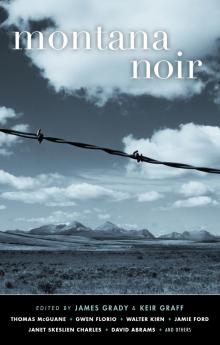 Montana Noir
Montana Noir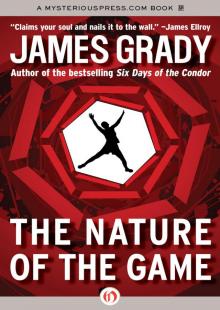 Nature of the Game
Nature of the Game Condor in the Stacks
Condor in the Stacks This Given Sky
This Given Sky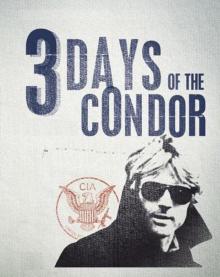 Three Days of the Condor
Three Days of the Condor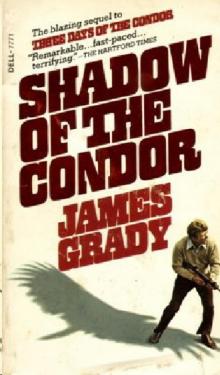 Shadow of the Condor
Shadow of the Condor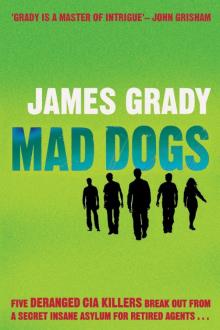 Mad Dogs
Mad Dogs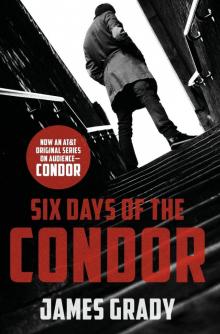 Six Days of the Condor
Six Days of the Condor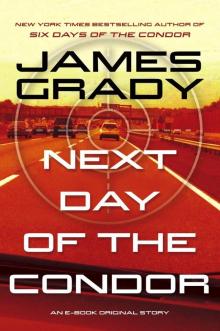 Next Day of the Condor
Next Day of the Condor